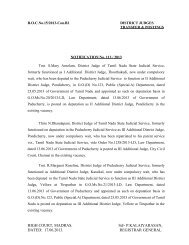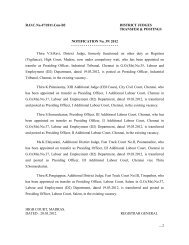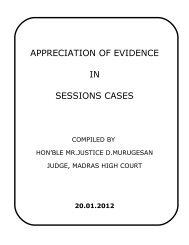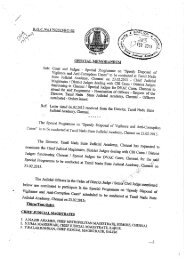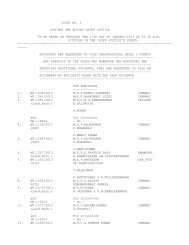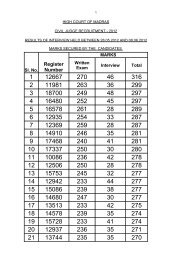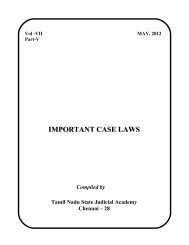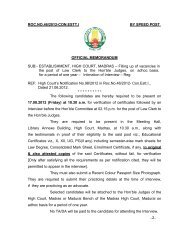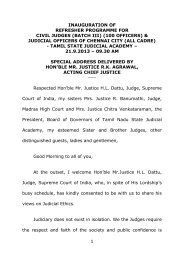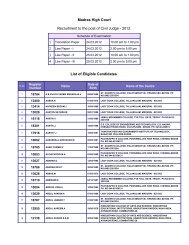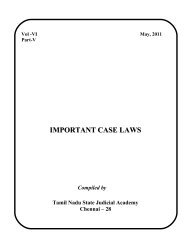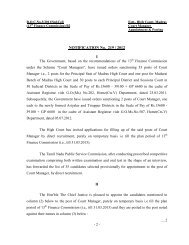Role of Prisoners and Convicts under the Criminal Justice ...
Role of Prisoners and Convicts under the Criminal Justice ...
Role of Prisoners and Convicts under the Criminal Justice ...
You also want an ePaper? Increase the reach of your titles
YUMPU automatically turns print PDFs into web optimized ePapers that Google loves.
Techniques Act 1994, Protection <strong>of</strong> Women from Domestic Violence Act 2005, <strong>and</strong> o<strong>the</strong>rs outline what<br />
constitute criminal <strong>of</strong>fences <strong>under</strong> Indian Law. The India Evidence Act sets forth <strong>the</strong> rules <strong>under</strong> which<br />
evidence is admissible in Indian Courts. And <strong>the</strong> Code <strong>of</strong> <strong>Criminal</strong> Procedure <strong>of</strong> 1973 (CrPC), outlines <strong>the</strong><br />
procedural mechanisms for prosecuting criminal acts, providing for <strong>the</strong> constitution <strong>of</strong> criminal courts, <strong>the</strong><br />
procedure for conducting police investigations <strong>and</strong> arrests, <strong>and</strong> <strong>the</strong> procedure for holding criminal trials <strong>and</strong><br />
inquiries.<br />
The application <strong>of</strong> <strong>the</strong> CrPC generally extends to all criminal <strong>of</strong>fences, <strong>and</strong> to <strong>the</strong> entire territory <strong>of</strong><br />
India, excluding <strong>the</strong> State <strong>of</strong> Jammu <strong>and</strong> Kashmir, <strong>and</strong> some tribal areas (S.1 CrPC).<br />
One <strong>of</strong> <strong>the</strong> cardinal principles which has always to be kept in mind in our system <strong>of</strong> administration <strong>of</strong><br />
criminal justice is that a person arraigned as an accused is presumed to be innocent unless that<br />
presumption is rebutted by <strong>the</strong> prosecution by production <strong>of</strong> evidence as may show him to be guilty <strong>of</strong> <strong>the</strong><br />
<strong>of</strong>fence with which he is charged. The burden <strong>of</strong> proving <strong>the</strong> guilt <strong>of</strong> <strong>the</strong> accused is upon <strong>the</strong> prosecution<br />
<strong>and</strong> unless it relieves itself <strong>of</strong> <strong>the</strong> burden, <strong>the</strong> Court cannot record a finding <strong>of</strong> guilt <strong>of</strong> <strong>the</strong> accused. If two<br />
views are possible one pointing to <strong>the</strong> guilt <strong>of</strong> <strong>the</strong> accused <strong>and</strong> <strong>the</strong> o<strong>the</strong>r to his innocence, <strong>the</strong> view which is<br />
favourable to <strong>the</strong> accused has to be accepted.<br />
D.K.BASU – DIRECTIONS:-<br />
While we are on <strong>the</strong> subject it is important to note directions issued by <strong>the</strong> Supreme Court in D.K.Basu<br />
vs. State <strong>of</strong> W.B. AIR 1997 SC 619, wherein <strong>the</strong> Supreme Court laid down <strong>the</strong> requirements to be followed<br />
in all cases <strong>of</strong> arrest or detention till legal provisions are made in that behave as preventive measures:-<br />
We, <strong>the</strong>refore, consider it appropriate to issue <strong>the</strong> following requirements to be followed in<br />
all cases <strong>of</strong> arrest or detention till legal provisions are made in that behalf as preventive<br />
measures:<br />
(1) The police personnel carrying out <strong>the</strong> arrest <strong>and</strong> h<strong>and</strong>ling <strong>the</strong> interrogation <strong>of</strong> <strong>the</strong><br />
arrestee should bear accurate, visible <strong>and</strong> clear identification <strong>and</strong> name tags with <strong>the</strong>ir<br />
designations. The particulars <strong>of</strong> all such police personnel who h<strong>and</strong>le interrogation <strong>of</strong> <strong>the</strong><br />
arrestee must be recorded in a register.<br />
(2) That <strong>the</strong> police <strong>of</strong>ficer carrying out <strong>the</strong> arrest <strong>of</strong> <strong>the</strong> arrestee shall prepare a memo <strong>of</strong><br />
arrest at <strong>the</strong> time <strong>of</strong> arrest <strong>and</strong> such memo shall be attested by at least one witness, who may<br />
ei<strong>the</strong>r be a member <strong>of</strong> <strong>the</strong> family <strong>of</strong> <strong>the</strong> arrestee or a respectable person <strong>of</strong> <strong>the</strong> locality<br />
from where <strong>the</strong> arrest is made. It shall also be countersigned by <strong>the</strong> arrestee <strong>and</strong> shall contain<br />
<strong>the</strong> time <strong>and</strong> date <strong>of</strong> arrest.<br />
(3) A person who has been arrested or detained <strong>and</strong> is being held in custody in a police<br />
station or interrogation centre or o<strong>the</strong>r lock-up, shall be entitled to have one friend or relative<br />
or o<strong>the</strong>r person known to him or having interest in his welfare being informed, as soon as<br />
practicable, that he has been arrested <strong>and</strong> is being detained at <strong>the</strong> particular place, unless <strong>the</strong><br />
attesting witness <strong>of</strong> <strong>the</strong> memo <strong>of</strong> arrest is himself such a friend or a relative <strong>of</strong> <strong>the</strong> arrestee.<br />
(4) The time, place <strong>of</strong> arrest <strong>and</strong> venue <strong>of</strong> custody <strong>of</strong> an arrestee must be notified by <strong>the</strong><br />
police where <strong>the</strong> next friend or relative <strong>of</strong> <strong>the</strong> arrestee lives outside <strong>the</strong> district or town through<br />
<strong>the</strong> Legal Aid Organisation in <strong>the</strong> District <strong>and</strong> <strong>the</strong> police station <strong>of</strong> <strong>the</strong> area concerned<br />
telegraphically within a period <strong>of</strong> 8 to 12 hours after <strong>the</strong> arrest.<br />
(5) The person arrested must be made aware <strong>of</strong> this right to have someone informed <strong>of</strong><br />
his arrest or detention as soon as he is put <strong>under</strong> arrest or is detained.



